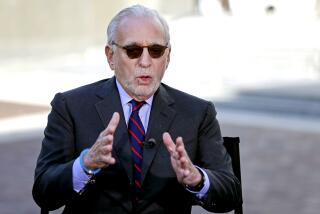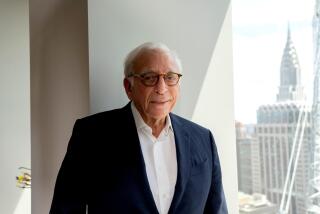NYSE Proposes New Rules for Boards
NEW YORK — The New York Stock Exchange, seeking to restore investor confidence that has been rocked by a spate of financial scandals, proposed new rules Thursday aimed at increasing the independence and integrity of corporate boards of directors.
The changes, which were drawn up by a committee and will be voted on by the NYSE board Aug. 1, are aimed at stemming criticism that the exchange failed to limit conflicts of interest at energy trader Enron Corp., formerly listed on the NYSE.
For the record:
12:00 a.m. June 8, 2002 For The Record
Los Angeles Times Saturday June 08, 2002 Home Edition Main News Part A Page 2 National Desk 7 inches; 262 words Type of Material: Correction
NYSE reforms--A story in Friday’s Business section incorrectly reported that a reform plan proposed by the New York Stock Exchange would exempt so-called treasury-share plans from being voted on by a company’s stockholders. Under the plan, shareholders would have the right to vote on all stock-option plans proposed by corporate managements.
Enron’s board included directors with financial ties to the company who failed to detect accounting irregularities that led to the biggest U.S. bankruptcy.
Among the major provisions, the new rules would give shareholders at the 2,800 NYSE-listed companies the right to vote on all stock option plans. Currently, shareholders have a say only on grants to officers and directors, but not on broad-based programs extended to lower-level employees.
The NYSE proposal also would require that within two years, the majority of a company’s board members would have to be independent or unaffiliated with the company and its management. It also would tighten the standards to qualify as independent.
The NYSE proposals were applauded by outside experts, who said they would go a long way toward reining in cronyism and other abuses.
“I’m close to overjoyed,” said Nell Minow, a longtime shareholder advocate. “I’m a professional critic by nature and by career choice, and I find it hard to criticize anything” in the NYSE plan.
Securities and Exchange Commission Chairman Harvey L. Pitt also praised the proposals.
Still, business leaders already have voiced objections to the stock option proposal.
Stephen Sanger, chairman of General Mills Inc. and an official of the Business Roundtable, a lobbying group representing major corporations, criticized the requirement that shareholders approve all stock compensation plans.
Broad-based plans are used by corporations as an incentive for employees and to “align their interest with shareholders,” Sanger wrote to NYSE Chairman Richard Grasso.
Other parts of the proposal would:
* Require corporate audit, nominating and compensation committees to consist solely of independent directors, with a requirement that the chair of the audit committee have accounting or financial management experience. In a direct response to the Enron debacle, audit committees would have sole responsibility to hire outside auditors.
* Allow the NYSE to issue public reprimand letters to companies violating corporate-governance requirements as a way to give investors an early warning sign of trouble. Companies that don’t comply with NYSE listing requirements can be suspended or delisted from the exchange, but that rarely occurs.
* Tighten the definition of an independent director, including a five-year “cooling-off period” for former employees instead of the current three years.
* Require independent directors to meet regularly without management to give them the chance to discuss sensitive issues without feeling pressured by company executives.
Despite the favorable response, some experts said certain proposals should be toughened. They also worried that the overall plan might be watered down as companies weigh in with their objections during a two-month public comment period.
“They went a long way,” said Charles Elson, director of the Center for Corporate Governance at the University of Delaware. “On the other hand, they could have gone further.”
For example, former employees could qualify as independent directors if they have been retired for five years and don’t have a material financial relationship with the company.
But “independent means no financial relationship to the company at all,” Elson said. He also would prefer that at least 80% of a company’s directors be independent.
The stock option provision also contains a potentially significant loophole, some experts said.
Under the plan, option grants of so-called treasury shares would not be subjected to shareholder votes. These are shares the company purchases in periodic stock buybacks and later doles out in the form of options.
Critics say that could be a way for chief executives to accumulate large numbers of options at company expense without shareholder approval.
“It’s kind of like saying [to shareholders], ‘Here’s this great sandwich, but we’re going to take a couple of bites out of it first,’ ” said Patrick McGurn, vice president at Institutional Shareholder Services, an investment consulting firm.
The Nasdaq Stock Market forwarded its own corporate governance proposal to the SEC on Thursday, but it was widely panned as falling short of the NYSE offering.
On stock options, for example, Nasdaq would require shareholder votes only for grants that include officers and directors, not broader programs for other workers.
Critics say that would dilute shareholder ownership and run the risk that only top executives would obtain options.
But Edward Knight, Nasdaq general counsel, pointed out that Nasdaq will consider an even tougher plan next month.
More to Read
Inside the business of entertainment
The Wide Shot brings you news, analysis and insights on everything from streaming wars to production — and what it all means for the future.
You may occasionally receive promotional content from the Los Angeles Times.










